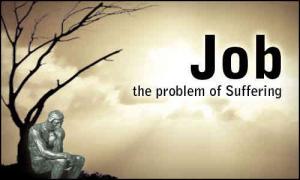 A creative editor changed an old story about a character named Job. This editor challenged, through Job’s new voice , the Jews’ traditional explanation of suffering. No new explanation, only courage and hope in the face of suffering, is given. Episode 15-2 of the Rowing with Michael Series: A journey through the Jewish/Christian Scriptures in Verse and Commentary. Part One of this Episode is here. Introduction and Contents for this series HERE.
A creative editor changed an old story about a character named Job. This editor challenged, through Job’s new voice , the Jews’ traditional explanation of suffering. No new explanation, only courage and hope in the face of suffering, is given. Episode 15-2 of the Rowing with Michael Series: A journey through the Jewish/Christian Scriptures in Verse and Commentary. Part One of this Episode is here. Introduction and Contents for this series HERE.
Michael, row the boat ashore. Alleluia….
Job had money and life was good. Alleluia.
Surely he was living the way he should. Alleluia.
He lost it all and they said he’d sinned. Alleluia.
But the answer is blowin’ in the wind. Alleluia.
Jews at one time (and, I think a lot of people today) explained suffering as God’s punishment for sin. The Babylonian Captivity in the middle years of the 6th century BCE was a pivotal moment of Jewish suffering and Jewish thinking about the problem of suffering. Cyrus, the Persian king who conquered the Babylonians, allowed the Jews to return to their homeland. Many Jews stayed behind, and soon the Jews were suffering again. Cyrus’ successors on the Persian throne were not kindly disposed toward foreigners who remained. Would this old explanation satisfy their needs?
A poetic genius among the Jews in Babylon didn’t think so. He found and changed an old story about a man named Job. (Reference: “The Book of Job and the Origins of Judaism,” Biblical Theology Bulletin) In the old story Job bears his suffering patiently until God, satisfied that he had atoned for his sins, shows mercy. Already this story was a change from traditional belief. Israelites had long found consolation in the hope that the nation would live through hard times. They would atone for their sin, and experience God’s favor once again. Job’s story, first edition, located relief from suffering in individual rather than in the nation.
The Bible’s new insight
Now a new author makes several additions to the old story. There are dialogues between Job and his friends, who came, they say, to comfort him in his suffering. “Comfort” consists in insisting that Job must have sinned to deserve all this punishment. The solution is for Job to admit it and repent like the Job of the first story. Then God will once more show mercy.
In the new story, Job suffers like the original Job. But, unlike that original, he rebels against his lot. He rejects all the rationalizations of the “friends” who come to comfort him. They assume he must be guilty of something or he wouldn’t be suffering like this. He knows he doesn’t deserve it. There’s no justice to it, nothing good at all in this suffering. He even challenges God to give him a hearing. This Job is anything but patient. God, finally rising to the challenge, speaks out of a whirlwind and gives no answer at all. Just as the song says, the answer is “blowin’ in the wind.”
This story tells Jewish people not to put the burden of solving the problem of suffering on God. Suffering doesn’t just go away when we do all that we imagine God wants. It’s something to deal with as best we can. Job eventually recovers from the disasters that claimed him for a while. That part belonged to the original story, and the new author simply repeats it at the end. In the new story, though, it’s not patience or contrition that wins the victory. It’s Job’s dogged determination not to give in, not to deny what he absolutely knows: this suffering is wrong. God tells Job’s friends, “You have not spoken rightly about me as has my servant Job.”
Where the Bible is not strong
Once in a while the Bible comes up with a theory or hypothesis to explain some puzzling phenomenon, but that’s not the Bible’s strong suit. The theory that suffering is punishment from God is a case in point. The final author of Job wants us to know just how inadequate that theory is. He would have had some pretty scathing retorts to today’s Christians who explain natural catastrophes or unnatural horrors that people impose on each other as God’s punishment for some favorite “sin”—homosexuality, taking God out of schools, or whatever.
All through the Book of Job the reader is expecting to find some new theory to replace the old, but no such theory is provided. I think that’s exactly right. Evil doesn’t deserve an explanation. When you hear some supposedly wise saying about suffering, stop and think if it’s just making evil things out to be not really so bad after all. Here are some examples:
- Evil is just the other side of the coin.
- Dark times are the shadow that makes the light all the brighter.
- Suffering is the necessary contrast. How could we know how good we have it without some suffering to compare?
- Suffering is an illusion and so is the whole material world. Enlightenment will put us above all that.
- Suffering stirs up the virtue of compassion and the fighting spirit that leads to great accomplishments.
- It’s only temporary and it just gives us a “higher” place in heaven.
Job actually has something to say about that last theory. He doesn’t believe it. (Job, Chapter 14) Though belief in an afterlife was common among surrounding peoples, it didn’t gain acceptance among Jews until very late. The afterlife appears in Jewish writing only the one or two centuries before Jesus’ time. Even then not all believed it.
Why does God allow suffering, especially suffering of the innocent? I don’t think the Bible gives a definitive answer. I find encouragement in the Bible as a whole because of its realism in the face of the problem, the courage of the people on its pages who resist suffering, and the honesty of the writers who tried to make sense of it without excusing themselves and without blaming God. And they didn’t fall for the pessimistic philosophy that all we can look forward to is an unending cycle of good and evil, peace and war, prosperity and want, suffering and relief. Well, most of the time they didn’t fall for it, but that sentiment also is found in the Bible.











